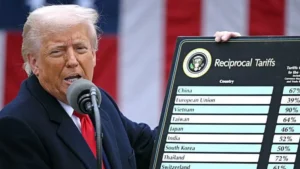Federal Appeals Court Pauses Ruling That Blocked Trump’s Tariffs
A federal appeals court has temporarily halted a ruling from the U.S. Court of International Trade (CIT) issued Wednesday night, which blocked tariffs imposed by former President Donald Trump.
The U.S. Court of Appeals for the Federal Circuit’s decision reinstates Trump’s authority to impose tariffs under emergency powers he invoked earlier this year. The court also requested both parties to submit written briefs on the issue, with deadlines set for early next month.

In a post on Truth Social Thursday evening, Trump criticized the CIT decision, arguing that it undermines presidential authority and would force the executive branch to seek Congressional approval for reciprocal tariffs. He also urged the Supreme Court to overturn the CIT ruling.
“The U.S. Court of International Trade incredibly ruled against the United States of America on desperately needed Tariffs,” Trump wrote. “Fortunately, the full 11-Judge Panel on the U.S. Court of Appeals has just stayed the order… Hopefully, the Supreme Court will reverse this horrible, Country-threatening decision QUICKLY and DECISIVELY.”
Peter Navarro, Trump’s top trade adviser, commented that the stay was expected and that the administration is evaluating all strategic options.
“We expect to hear soon from the United States Trade Representative regarding our response,” Navarro said. “We believe we have a strong legal position.”
This development adds to the uncertainty surrounding Trump’s tariff policies, which have been central to his economic agenda. The CIT ruled that Trump lacked the authority under the International Emergency Economic Powers Act (IEEPA) to implement broad tariffs. The administration appealed immediately, leading to a fast-moving legal standoff over a policy Trump argues is key to revitalizing American manufacturing—though critics say it raises costs for businesses and consumers.
Less than 24 hours after the CIT decision, the appeals court issued its stay. Navarro also hinted that the administration may pursue other legal mechanisms to enforce the tariffs.
“I can assure the American people that the Trump tariff agenda is alive, well, and will continue to protect American jobs and industries,” he added.
The Liberty Justice Center, representing companies opposing the tariffs, described the stay as a procedural step and said it remains confident that the appeals court will ultimately reject the government’s position.
“The court is merely considering the government’s request for a longer stay,” said Jeffrey Schwab, senior counsel at the Liberty Justice Center. “We believe the court will soon recognize the irreparable harm these tariffs cause to our clients.”
Rapid Developments Create Legal Whirlwind
The CIT’s initial ruling and the appeals court’s stay came within a single day, contributing to a whirlwind of legal activity surrounding Trump’s trade policies.
On Wednesday, CIT judges blocked all tariffs Trump imposed under IEEPA, including the so-called “Liberation Day” tariffs announced on April 2 and others targeting China, Mexico, and Canada in response to fentanyl trafficking. However, tariffs on autos, steel, aluminum, and auto parts under Section 232 of the Trade Expansion Act remain unaffected.
The CIT’s ruling resolved two lawsuits: one filed by the Liberty Justice Center on behalf of several small businesses, including wine-seller VOS Selections, and another from 12 Democratic-led states challenging the tariffs. The court ordered the administration to roll back the tariffs within 10 calendar days.
Trump’s legal team filed its appeal just hours later. The next day, the administration indicated it would escalate the case to the Supreme Court if neither the CIT nor the appeals court granted a stay.
At a Thursday press briefing, White House Press Secretary Karoline Leavitt sharply criticized the CIT ruling, labeling the panel “activist judges,” despite one being a Trump appointee. She accused them of abusing judicial power to undermine Trump’s executive authority.
The Federal Circuit Court of Appeals granted the stay later that afternoon, setting June 5 as the deadline for plaintiffs’ response and June 9 for the government’s reply.
In a separate legal development Thursday, U.S. District Court Judge Rudolph Contreras ruled in favor of two American toy companies, Learning Resources and hand2mind, stating that Trump’s tariffs would cause them irreparable harm and that IEEPA does not authorize such tariffs. Contreras issued a preliminary injunction but paused it for two weeks to allow for an appeal, which the Trump administration has already filed with the D.C. Circuit Court of Appeals.
